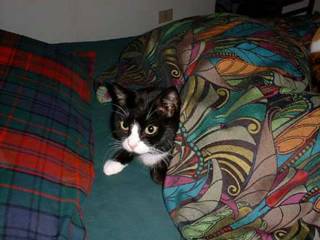
天氣一變冷,跟寶貝貓的戰爭也開始了。
When it starts to get colder, the war with Palu starts.
家中最寶貝的貓兒,從小就有呼吸道的問題,入秋以來,常常就得面對氣喘加上打噴嚏的問題,狀況太糟糕的時候,我們就得要想辦法給藥吃。
Palu is the loveliest cat at home. He’s got respiratory problem since young. After entering autumn, asthma and sneezing become common stories. When it’s getting worse, we’ll always have to try to give him some medicine.
吃藥時的磨人性格,有時讓人很難捉摸。向來習慣用小湯匙吃藥的他,有一天突然決定不要用小湯匙吃了,老公只得把混著化毛膏的藥抹在自己手上,讓他舔著吃,偶爾,還得追著跑,求他吃藥。貓,就跟小孩子一樣。
He’s got a very difficult personality when he takes his medicine, and sometimes it’s quite difficult to handle. He used to take his medicine with a small spoon. One day, he decided that he doesn’t want it any more, and Michele has to put the creamy medicine on his finger for Palu to lick. Once in a while, he’ll have to follow Palu all around the house and beg him to take his medicine. Cats are like kids.
前兩天,他覺得老公的手指不好吃了,不論我們怎麼求他,就是不願舔一口。一氣之下,老公抓起他的前腳,就這麼把藥給抹了上去。貓兒無法忍受腳掌上的髒污,會想盡辦法把它清理乾淨。倔強如他,就看著他在屋裡跑來跑去,用力地甩著前腳,怎樣都不肯在我們面前舔一下藥,這樣的舉動也把我們搞火了,晚上睡覺時索性把房門一關,不讓他進來。這也真是找罪受,固執的他一整晚都在門外,三不五時抓一下門,打個噴嚏,讓人不得好眠,不過我們也沒有因此就讓步,房門關緊直到天明。
A couple days ago, Palu decided that Michele’s finger is not good any more, and just didn’t want his medicine no matter how we begged him. With anger, Michele grabbed his front paw and buttered the cream on his paw. Normally, cats can not stand dirty paws and will do anything to clean themselves. Stubborn as Palu is, he was running around the house, swinging and shaking so hard to get rid of the cream on the paw. No matter what, he didn’t want to lick his paw in front of us. We got so angry with him that we shut him outside our room in the night. He was beside our door the whole night, scratched the door and sneezed once in a while, and made it difficult for us to sleep. We didn’t surrender and keep the door shut until morning.
隔天早上,他一聽到老公打開房門走進廁所梳洗,咚咚咚地馬上跑去報到。老公順著要求把他抱到懷中,說時遲那時快,一到懷裡馬上打個大噴嚏幫老公洗臉,一溜煙就不見貓影。看樣子…這場人貓大戰大概還會繼續持續下去…至少到春天到來。
The next morning, he arrived the bathroom once he heard Michele moving. Michele picked him up according to his request. Guess what?! He sneezed on Michele’s face and ran away immediately. I guess this war between human and cat will go on for a while…at least until the arrival of spring.



